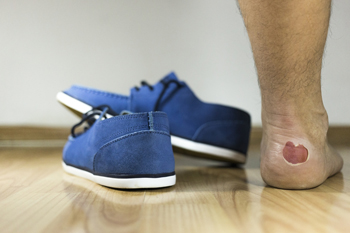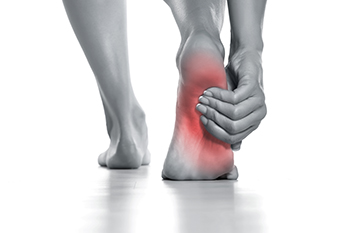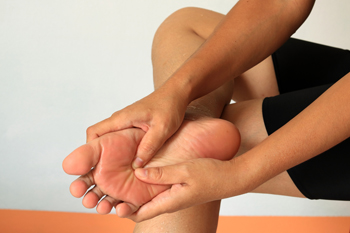Items filtered by date: December 2023
Diabetic Foot Blisters

Diabetic foot blisters are a rare, but distinctive complication of diabetes. They typically manifest as painless blisters on the feet of people with diabetes, often without an obvious cause like injury or friction. These blisters can resemble burn blisters, presenting a risk for infection, especially given the compromised wound-healing abilities associated with diabetes. The skin of diabetic patients is vulnerable due to a combination of poor circulation, diabetic neuropathy, and other skin complications like dryness and poor healing. Management of diabetic foot blisters involves careful monitoring to prevent infection, control of blood sugar levels to aid in healing, and protection from further injury. In most cases, they may resolve on their own with good diabetes management and proper foot care, which includes wearing well-fitting shoes and avoiding walking barefoot. However, if you are diabetic and have any new or worsening foot issues, it is strongly suggested that you make an appointment with a podiatrist to ensure timely and appropriate treatment.
Blisters may appear as a single bubble or in a cluster. They can cause a lot of pain and may be filled with pus, blood, or watery serum. If your feet are hurting, contact one of our podiatrists of Mercer Ocean Podiatry. Our doctors can provide the care you need to keep you pain-free and on your feet.
Foot Blisters
Foot blisters are often the result of friction. This happens due to the constant rubbing from shoes, which can lead to pain.
What Are Foot Blisters?
A foot blister is a small fluid-filled pocket that forms on the upper-most layer of the skin. Blisters are filled with clear fluid and can lead to blood drainage or pus if the area becomes infected.
Symptoms
(Blister symptoms may vary depending on what is causing them)
- Bubble of skin filled with fluid
- Redness
- Moderate to severe pain
- Itching
Prevention & Treatment
In order to prevent blisters, you should be sure to wear comfortable shoes with socks that cushion your feet and absorb sweat. Breaking a blister open may increase your chances of developing an infection. However, if your blister breaks, you should wash the area with soap and water immediately and then apply a bandage to the affected area. If your blisters cause severe pain it is important that you call your podiatrist right away.
If you have any questions, please feel free to contact our offices located in Hamilton, Toms River, and Plainsboro Township, NJ . We offer the newest diagnostic and treatment technologies for all your foot care needs.
Wounds That Don't Heal Need to Be Checked
Different Types of Heel Pain

Heel pain is a common issue that can have various causes, often related to mechanical factors. The location of the pain can provide clues for diagnosis. Plantar fasciitis, a prevalent condition, leads to medial plantar heel pain, especially during the first steps in the morning or after rest. Other causes of plantar heel pain include calcaneal stress fractures, nerve entrapment, heel pad syndrome, neuromas, and plantar warts. Posterior heel pain is often due to Achilles tendinopathy, while pain at the tendon's insertion point is related to other tendinopathies. Haglund deformity, a protrusion of the calcaneus, can cause pain between the calcaneus and Achilles tendon. In children, Sever’s disease, a calcaneal apophysitis, may be the cause. Medial midfoot heel pain, especially with weight-bearing, might be linked to tarsal tunnel syndrome, caused by nerve compression. Sinus tarsi syndrome leads to lateral midfoot heel pain. If you have heel pain, it is suggested that you schedule an appointment with a podiatrist for a diagnosis of the problem so that the proper treatment can be provided.
Many people suffer from bouts of heel pain. For more information, contact one of our podiatrists of Mercer Ocean Podiatry. Our doctors can provide the care you need to keep you pain-free and on your feet.
Causes of Heel Pain
Heel pain is often associated with plantar fasciitis. The plantar fascia is a band of tissues that extends along the bottom of the foot. A rip or tear in this ligament can cause inflammation of the tissue.
Achilles tendonitis is another cause of heel pain. Inflammation of the Achilles tendon will cause pain from fractures and muscle tearing. Lack of flexibility is also another symptom.
Heel spurs are another cause of pain. When the tissues of the plantar fascia undergo a great deal of stress, it can lead to ligament separation from the heel bone, causing heel spurs.
Why Might Heel Pain Occur?
- Wearing ill-fitting shoes
- Wearing non-supportive shoes
- Weight change
- Excessive running
Treatments
Heel pain should be treated as soon as possible for immediate results. Keeping your feet in a stress-free environment will help. If you suffer from Achilles tendonitis or plantar fasciitis, applying ice will reduce the swelling. Stretching before an exercise like running will help the muscles. Using all these tips will help make heel pain a condition of the past.
If you have any questions please contact our offices located in Hamilton, Toms River, and Plainsboro Township, NJ . We offer the newest diagnostic and treatment technologies for all your foot and ankle needs.
Peripheral Neuropathy

Common peroneal nerve dysfunction, also known as common fibular nerve dysfunction, involves damage to the peroneal nerve, affecting movement and sensation in the foot and leg. This condition can occur at any age and is a type of peripheral neuropathy, specifically mononeuropathy, where a single nerve is damaged. Causes can range from knee trauma, fibula fracture, tight casts, habitual leg crossing, to pressure during sleep or surgery. It is also seen in individuals with anorexia, autoimmune conditions, diabetes, alcohol use, or inherited disorders like Charcot-Marie-Tooth disease. Symptoms include decreased sensation, numbness, tingling in the leg, foot dropping, a slapping gait, toe dragging, and muscle weakness. Diagnosis involves a physical exam, electromyography, nerve conduction tests, MRI, and nerve ultrasound. Potential complications may include reduced walking ability and permanent sensation loss or weakness in the legs or feet. If you have symptoms of peripheral neuropathy, it is suggested that you schedule an appointment with a podiatrist to discuss treatment options.
Neuropathy
Neuropathy can be a potentially serious condition, especially if it is left undiagnosed. If you have any concerns that you may be experiencing nerve loss in your feet, consult with one of our podiatrists from Mercer Ocean Podiatry. Our doctors will assess your condition and provide you with quality foot and ankle treatment for neuropathy.
What Is Neuropathy?
Neuropathy is a condition that leads to damage to the nerves in the body. Peripheral neuropathy, or neuropathy that affects your peripheral nervous system, usually occurs in the feet. Neuropathy can be triggered by a number of different causes. Such causes include diabetes, infections, cancers, disorders, and toxic substances.
Symptoms of Neuropathy Include:
- Numbness
- Sensation loss
- Prickling and tingling sensations
- Throbbing, freezing, burning pains
- Muscle weakness
Those with diabetes are at serious risk due to being unable to feel an ulcer on their feet. Diabetics usually also suffer from poor blood circulation. This can lead to the wound not healing, infections occurring, and the limb may have to be amputated.
Treatment
To treat neuropathy in the foot, podiatrists will first diagnose the cause of the neuropathy. Figuring out the underlying cause of the neuropathy will allow the podiatrist to prescribe the best treatment, whether it be caused by diabetes, toxic substance exposure, infection, etc. If the nerve has not died, then it’s possible that sensation may be able to return to the foot.
Pain medication may be issued for pain. Electrical nerve stimulation can be used to stimulate nerves. If the neuropathy is caused from pressure on the nerves, then surgery may be necessary.
If you have any questions, please feel free to contact our offices located in Hamilton, Toms River, and Plainsboro Township, NJ . We offer the newest diagnostic and treatment technologies for all your foot care needs.

